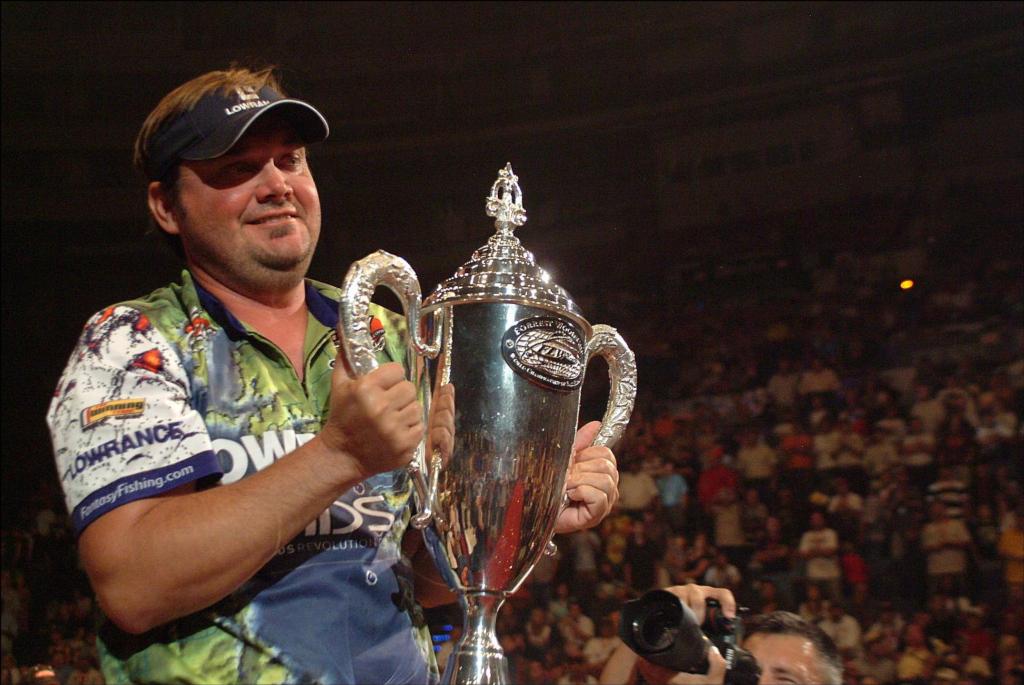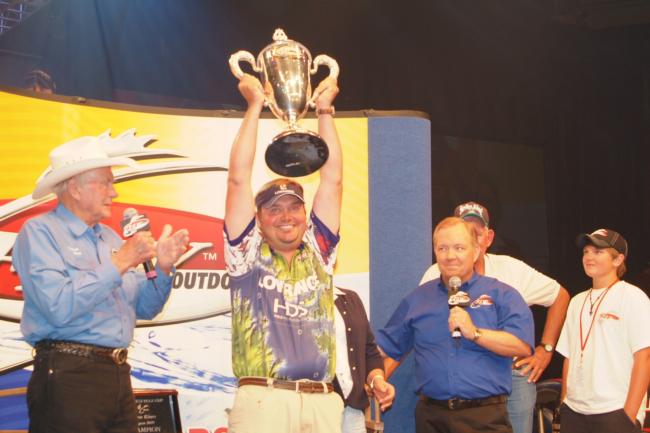Reel Chat with GREG HACKNEY

– MODERATOR COMMENT –
Welcome to FLW Live Reel Chat. Today we’re joined by veteran pro angler Greg Hackney. With just over $1 million in career earnings at FLW Outdoors events, Hackney has recorded 27 top-10 finishes and four titles since he began his fishing career with FLW Outdoors back in 1995.
– MODERATOR COMMENT –
However, no victory was bigger than his recent 2009 Forrest Wood Cup win in Pittsburgh, where the Louisiana native managed to walk away with $500,000 in prize money after pulling off a dramatic first-place finish by a slim 3-ounce margin.
– MODERATOR COMMENT –
Today, Greg Hackney is here to take questions from you, the fans. So, without further delay, let’s get started.
Q: Congratulations on your championship victory! What was it like to win the Forrest Wood Cup? And how does that victory rank in your career achievements?
— Jon Pageler (New York, N.Y.)
A: It was by far the pinnacle of my career. Nothing I’ve ever done before compares to that. The best thing I’d won before that was the FLW Tour Angler of the Year in 2005. It was the most emotional thing I’ve ever won. I still have to think about it — it doesn’t seem real. It’s definitely a life-changing event — and it’s not just about the money. To win the championship title itself was just unbelievable.
Q: When was the first time during Cup competition when you thought, “You know what, I have a real chance to win this”?
— Jon Stebbins (San Diego, Calif.)
A: Probably it hit me when Scott Suggs weighed in during the final day. The third day of the tournament I caught a fish that I’d seen on the first day of the tournament but couldn’t catch. But I wound up catching that fish on day three with like five minutes left in the day, and those are the kinds of things that need to happen in order to win. After that I started thinking that I’m making all of the right decisions. But honestly, even after I checked in on day four, I knew I never did catch that big bite, so I thought I was probably fishing for second — at least when I initially checked in. I honestly felt like 6 pounds a day would win the tournament, and it did. And that’s exactly how it turned out.
Q: How big was the bass you sight-fished on day two of the Cup? Did it bite on the first pitch, and what bait were you using at the time?
— Mark R. (Latrobe, Pa.)
A: It was a 3-pounder, and it did bite on the first cast. I caught it on a 4-inch Ocho wacky-rigged. Basically, I pitched the bait upstream and let it drift downstream in the current toward a big log. And the bass just ambushed it.
Q: Now that you’ve won the Forrest Wood Cup, will you be approaching the 2010 season any differently?
— Pat Zak (Oakland, Calif.)
A: Not consciously, but I’m sure I will mentally. Honestly, this win gives me a lot of cushion. It really helps when you don’t have to worry about finances. It’s always better to head into a tournament when you only have to concentrate on fishing and nothing else. It definitely allows you to fish a lot more freely.
Q: What is your favorite all-time body of water to fish?
— Samantha (Long Island, N.Y.)
A: Three Rivers in Pittsburgh (laughing). I really don’t have a favorite lake per se, but I want it to be shallow with lots of cover: aquatic vegetation, wood, etc. But when I get a chance to go fishing and relax, 99 percent of the time I’ll go to Venice, Louisiana. It’s one of those places where I can catch a bass, a shark, redfish … when I go there I’m like a kid. It’s by far the greatest fishing you can have. It’s the only place in the world where you can actually be reeling in a bass and have a bulll shark bite it. It’s like being in another world.
Q: How do you go about scouting a tournament lake that you’ve never fished before? Where do you even begin?
— Jim Interlandi (Chicago, Ill.)
A: The first thing I do is find out a little bit about the lake for a tournament. I’ll check past tournament results, the history and composition of the lake. If the lake has grass, that’s the first place I’m going. I’ll also check out the time of year, whether to start in the back of the creeks, etc. If it’s a prespawn time, I’ll look for obvious spawning areas. But normally, the Internet is where I start doing research for all of my tournaments. I actually don’t like talking to locals directly, because they’ll give you their opinion whether they’re right or wrong. Locals tend to be spot fishermen, and most of the tournaments are won fishing a particular pattern. So it’s rare that a large tournament is won doing the same exact thing that locals are doing. So I always take that into consideration as well.
Q: Who coined the phrase Hack Attack? Is Hack Attack just a name, or is it a mentality?
— Tim (Little Rock, Ark.)
A: It started as just a name, but nicknames have a way of becoming a mentality. Fish Fishburne is actually the guy who first started calling me that.
Q: Did it feel weird at all winning FLW’s championship as an Elite Series pro? How has FLW treated you?
— Nick G. (Atlanta, Ga.)
A: Actually, I still consider myself an FLW pro. I actually got my start with FLW. It actually felt like coming home. I was the FLW Angler of the Year and grew up fishing against a lot of these guys, so it really felt like I was coming home. During the pretournament banquet, it was pretty emotional for me. So overall, yes, FLW Outdoors has treated me very well.
Q: With the lighter BASS schedule in 2010, is there any chance you’ll get to participate in any FLW Outdoors events next season?
— Titus Song (Minneapolis, Minn.)
A: I’m actually going to fish every FLW event possible — as many as I can get in — which could be as many as nine. I’ve actually spent a lot of time thinking about that, and I’ve begun to try to put down next year’s schedule on paper.
Q: Don’t you feel bad for Ike (Mike Iaconelli)? He took second at the Classic and the Cup!
— Terry (Buford, Ga.)
A: No (laughing). If I felt sorry for him, I’d have to feel sorry for everyone behind me. I like Ike, but it’s a competition, and there has to be a winner and there has to be a loser. That’s just fishing.
Q: What keeps you motivated when fishing is tough? Do you have a regular pratice routine in the offseason?
— Shawn V. (Bloomington, Ind.)
A: The biggest thing that keeps me motivated is past success, because it’s so hard to get that feeling, and it  feels so good that you always want more of it. Once you do well, you expect yourself to do well again. And success, like in everything else, usually breeds more success.
feels so good that you always want more of it. Once you do well, you expect yourself to do well again. And success, like in everything else, usually breeds more success.
Q: What was your impression of Pittsburgh and the Three Rivers system during the Cup?
— Dan Stauffer (Creighton, Pa.)
A: The river system had really improved from 2005 when we were there during the Classic. The fish population has quadrupled since we were last there. The water looked better. The water was a lot cleaner. We had really bad conditions in 2005 as well. But, overall, I’d say the area has really improved.
Q: Overall, did you catch more fish (keepers) in the Kiski or the Allegheny?
— Greg (Dallas, Texas)
A: I probably caught most of my keepers in the Allegheny.
Q: What is your take on fishing difficult tournaments like the recent Cup event in Pittsburgh? Do you like tough events like that, or do you prefer venues where you can catch bigger and more quantities of fish?
— Andy Kurzwig (Charlotte, N.C.)
A: I would definitely prefer the tougher tournaments. I was fortunate to win the Cup, but tough tournaments definitely separate the field. When you go to a tough place like that, three-quarters of the field are out of the running before the event even starts. But in a slugfest, a lot of times it comes down to the luck of the bite, and you’re always competing against the whole field. I love to hear other anglers talk about how bad or how tough a tournament is going to be because that shows weakness. For example, everyone in the top 10 in the Cup was a great angler. Just look at that top 10: That was a tough field. In tough events, it’s really hard to luck into good catches. You might be able to do that one day, but not four days in a row. That’s why in those tournaments, you usually have the good anglers separating themselves from the rest of the field.
Q: How much are you involved in designing baits for your sponsors Strike King, Tru Tungsten and Youvella Hooks, and what was the last bait you have been working on?
— Trey Limb (Lilburn, Ga.)
A: I spend time on the phone with my tackle sponsors all the time. The last bait I’ve been working on is the Hack Attack jig; it’s actually out now. We showed it at ICAST this July, and it should be availabe in retail stores pretty soon.
Q: I was fishing in a local pond and caught an unusually colored bass. It is not a managed pond, and it has a red clay bottom. What could cause the bass to look blue, almost like a blue catfish?
— Jonathan (Marion, S.C.)
A: As far as the blue color, I’m not sure, but it could be because of an algae bloom — something in the pond itself that causes that. But I’m not entirely sure.
Q: Greg, do you have any advice for someone interested in becoming a professional bass angler? I just started fishing local club tournaments, but I wanted to know what I should do to take the next step.
— Eric Holmes (Los Angeles, Calif.)
A: Actually, you’ve done the right thing. Personally, I believe in taking baby steps. I know a lot of good fishermen who got burned out because they made the jump to the next level too soon. I went through the BFLs, Strens and then the FLW Tour. That’s how it was for me. I’m not saying that everyone has to take that exact route, but you need to have confidence to move on to the next levels. It’s almost like you can be a star in a college sport, but then when you go to the pros, everybody is a star. You went from the big man on campus to a situation where everyone is a big man on campus. This sport isn’t going away, so you don’t ever have to be in too big of a hurry. But when you do get to that top level, I can promise you it is all that.
– MODERATOR COMMENT –
Unfortunately, fishing fans, that’s all the time we have to chat with Greg today. Thanks to all who tuned in and participated in today’s Reel Chat. And a special thanks to Greg Hackney for giving us his time and insights into tournament fishing. Check back shortly for a complete transcript of today’s FLW Live Reel Chat.